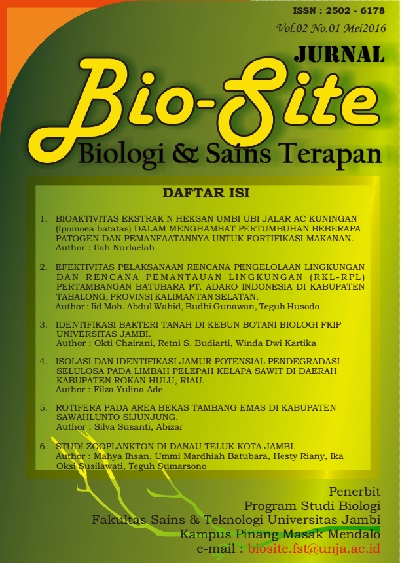Identifikasi Bakteri Tanah di Kebun Botani Biologi FKIP Universitas Jambi
Abstract
Soil bacteria has important role in the life cycle of an ecosystem. Their life activities affect the characteristics of the biologic, physical, and chemical environment. Biology study program of education faculty in Jambi University has a plot of land made into a botanical garden. Thus, this botanical garden needs some information about the fertility of the land used, and one of them is to know the type of bacteria in its soil as a biological factor. The purpose of this research is to determine the genus of bacteria found in soil of Biology Botanical Garden at Education Faculty (FKIP) of Jambi University, Mendalo. This research was conducted from April to July of 2015, in both biology botanical garden and biology laboratory at Education Faculty of Jambi University. The kind of this research is explorative descriptive. Soil sample was collected by using 4 squared plots measuring 12 m x 12 m. In each plot made 5 subplots and soil samples was taken from 3 points of each subplot by random sampling. The identification was done by observing colony morphology, gram staining, and biochemical tests. The result of this research was gained gained 9 genus of bacteria, they were Paracoccus, Nitrosococcus, Bacillus, Cellulomonas, Acinetobacter, Micrococcus, Pseudomonas, Azotobacter, and Zymomonas. It is suggested to further researchers to study about other microorganisms in the soil Biology Botanical Garden that have role in maintaining and improving soil fertility there.
Downloads
Downloads
How to Cite
Issue
Section
License
This work is licensed under a Creative Commons Attribution 4.0 International License.
Copyright Notice:
1. Authors retain copyright and grant the journal right of first publication with the work simultaneously licensed under a Creative Commons Attribution 4.0 International License that allows others to share the work with an acknowledgement of the work's authorship and initial publication in this journal.
2. Authors are able to enter into separate, additional contractual arrangements for the non-exclusive distribution of the journal's published version of the work (e.g., post it to an institutional repository or publish it in a book), with an acknowledgement of its initial publication in this journal.
3. Authors are permitted and encouraged to post their work online (e.g., in institutional repositories or on their website) prior to and during the submission process, as it can lead to productive exchanges, as well as earlier and greater citation of published work (The Effect of Open Access)






